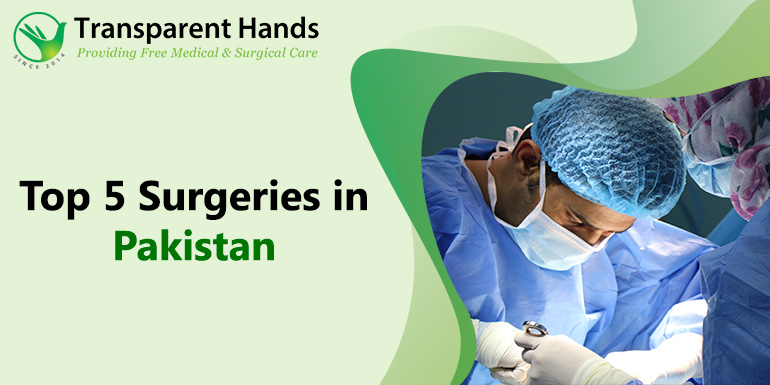Top 5 Surgeries in Pakistan

Surgery is a medical procedure that involves making incisions in the body to remove or fix a part of or an entire organ. It can either be diagnostic, also known as exploratory surgery, or fixating surgery to fix the problem within the body. Even though a number of surgeries are carried out on daily basis at hospitals, the top 5 surgeries in Pakistan include:
1. Coronary Artery Bypass Graft (CABG)
CABG is a heart surgery that is carried out by a cardiothoracic surgeon. It is done to relieve the obstruction in the coronary artery – vessels that supply blood to the heart. Patients with age above 50 are more likely to undergo this surgery.
As we grow older, the blood vessels lose their elasticity and become hardened. Furthermore, cholesterol also starts accumulating in the vessels, which prevents the flow of blood to the heart. Patients experiencing angina can be treated with medications. But if the obstruction blocks the entire flow, surgeons have to intervene and perform the surgery.
Surgeons take a graft of a blood vessel from another part of the body and use it to bypass the affected part of the coronary artery. When the graft is in place the blood can flow smoothly and prevent the patient from suffering myocardial infarction also known as Heart Attack.
CABG can be done for multiple coronary arteries depending on the number of blockades. The alternative to CABG is angioplasty but that is reserved for patients with less severe conditions. Surgery is done under general anesthesia and the recovery time is about 12 weeks after the operation.
Complications
- Surgical site infection
- Acute kidney injury
- Myocardial infarction
- Bleeding
Amputation: A common surgery in Pakistan
2. Cancer Removal Surgery
Cancer is one of the leading causes of death worldwide and the mortality rate in Pakistan is also significant. That’s why cancer removal surgery is one of the top 5 surgeries in Pakistan. Some malignant tumors can be removed via surgery and this is known as cancer removal surgery. Oncologists assist the surgeon in identifying the cancerous tissues and the team of surgeons takes them out.
The site of surgery depends on the location of the cancerous cells. In breast cancers, surgeons have to remove the entire breast which is known as mammectomy. Similarly, if the pancreas is affected, the surgeon may have to remove some part of or the entire organ. Depending on the type of organ affected by cancer, the removal surgeries may include:
- Thyroidectomy
- Hysterectomy
- Parathyroidectomy
- Craniotomy
- Orchidectomy
Sometimes surgeons also explore the body to look how far cancer has spread and such surgeries are known as exploratory surgeries.
3. Cesarean Section
Cesarean Section, commonly known as C-section, is performed on pregnant mothers to deliver the baby. While natural delivery is the preferred method there are several reasons physicians may recommend C-section. These include:
- Prolonged or stalled labor
- Abnormal positioning of the baby
- Fetal distress
- Birth defects
- Chronic health condition
- Cord prolapses
- Cephalopelvic disproportion
- Placental issues
- Multiple babies
C-sections are also sometimes done at the discretion of mothers. It is relatively less painful than normal delivery as the patient is under anesthesia. Recovery time is about six weeks provided that no complication occurs.
Complications Of C-Section
- Surgical Site Infection
- Postpartum Hemorrhage
- Blood clot
- Increased risk for future pregnancies
- Surgical injury
What is heart valve replacement?
4. Laparotomy
A surgical incision in the abdominal cavity for diagnosis or treatment of a medical condition is laparotomy. It is carried out to fix the problems within our abdominal region. The conditions that may require laparotomy include:
- Intestinal obstruction
- Intestinal adhesion
- Perforation in intestine or nearby organ
- Bleeding inside the abdomen
- Abdominal Trauma
- Removal of gallbladder
- Removal of ovaries, fallopian tubes, and uterus
It is carried out under general anesthesia by general surgeons. The recovery time depends on the region and extent of surgery.
Complications of Laparotomy
- Bleeding
- Infections
- Intestinal adhesion
- Clot
- Surgical injury to nearby organs
- Formation of internal scar tissues
- Bowel blockage
- Abdominal pain
5. Laparoscopy
A laparoscopy is an advanced form of laparotomy which was developed to mitigate the risk associated with cutting into the abdomen. With laparoscopy, surgeons make small holes inside the abdomen or pelvis and use specialized instruments to perform surgeries. Some conditions which may require laparoscopy include:
- Ovarian cancer
- Gallstones
- Pelvic inflammatory disease
- Ectopic pregnancies
- Fibroids
Laparoscopies are done under general anesthesia.
Complications of Laparoscopy
- Vascular Injuries
- Bowel Injuries
- Genitourinary injuries
- Incisional hernias
- Gas embolism
Blood Pressure Medications to Lower the Risk of Heart Ailments!
Bottom Line
Surgeries are carried out to eliminate potentially fatal medical problems in the patients. Although there is a certain risk associated with them, they carry more benefits. Transparent Hands provides all of these as well as other surgeries free of charge to deserving patients. We need your generous donations to keep doing so.










Leave Your Comments